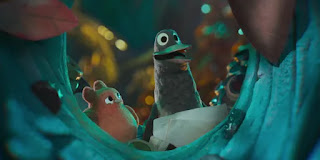The film Don’t Look Up took a lot of heat for being “messy” with “too many plots” and “too many messages” trying to address “too many problems”. But that’s kind of what I loved about it.
As the meme says, "I just wish we could just live in precedented times". There is way too much going on, too many huge problems to solve, and too many once-in-a-lifetime challenges we have to overcome. Much like those extreme weather events that we used to call ‘once-in-a-century’, epochal crises now take place every year.
I made a quick list of the pressing issues we need to address, in no real order, but just as they came to mind:
Covid
Climate
Change
Ukraine
Inflation/Supply
Chain
Toxic
(Social) Media
Anti-Democracy
Far Right & Election Safeguards
Illegitimate
Justice System & Policing Reform
Race,
Gender, & Sexuality Rights
Immigration
Campaign
Finance Reform & Lobbying
Gun
Violence
Wealth
Inequality
Healthcare
Public Education
So, if you’re making a movie about now, shouldn’t you include a few issues?
In the same week I saw Don’t Look Up I also finally watched Parasite. It was a very well-crafted movie. The cinematography, the acting, the pacing and tone – it’s worth a watch. But it was dealing with one issue: wealth inequality. That’s important, but it also made the world feel disconnected from reality. The setting reinforces this, I presume intentionally, by having only two main settings where almost all of the action takes place: the poor family’s house and the wealthy family’s house. It’s a parable – a grand one, possibly even Shakespearean – but somewhat hollow.
Don’t Look Up is not a better film than Parasite, and technically not as skilled. But it felt far, far more real. It addressed a few of the issues from my list above: climate change, toxic media, the MAGA far right, wealth inequality, and a few minor issues to boot, like the vapidity of celebrity culture and fecklessness of protest movements. If the film wants to reflect the reality of now, how can it not cover many issues? All of these problems we’re facing are interconnected. A broken media environment feeds a broken political system, which hamstrings effective responses to crises from immigration to gun violence… Each catastrophe produces cascades of intersecting problems. A war breaks out in Ukraine, and already high prices get worse.
Part of the difficulty, I think, with how Don’t Look Up was received was due to how it was sold. People wanted a straightforward, laugh-out-loud satire. I wouldn’t call the film a satire, though. If we have dramedies for blends of comedy and drama, we should have drama-satire blends, as well. Satire, by definition, uses exaggeration to expose stupidity. It's usually done in a funny way, but nothing about the definition requires it. There were parts of Don’t Look Up that had me laughing heartily, with seriously funny deadpan humor. But the satire of our response to climate change, and all the venial stupidity that is hampering an effective response, in the end has to underscore the seriousness, the drama, of what’s happening to our world. The movie, therefore, is a drama-satire blend, a ‘dra-mire’ if you will, and not a ‘ha-ha’ comedy. And that’s okay: in fact, it’s one of the film’s main strengths.
We inhabit a world of constant dissociation - the world is ending in a half dozen different ways, it seems, every week. Will Russia escalate a nuclear threat, or North Korea? Will sea level rise destroy the Bay Area, or a MAGA insurgency? Humans like to keep to our established patterns, and keep doing what worked for us in the past. But as Don't Look Up dra-mirizes, this sort of self-imposed refusal to change in order to accept the gravity of the situation proves absurd.
Jared Diamond, in Collapse, talks about how modern societies can be vulnerable to civilizational collapse: "First of all, a group may fail to anticipate a problem before the problem actually arrives. Second, when the problem does arrive, the group may fail to perceive it. Then, after they perceive it, they may fail even to try to solve it. Finally, they may try to solve it but may not succeed." In America today, facing climate change as an existential threat, we have examples of all of the first three. We didn't anticipate, for example, how much methane was trapped in the permafrost and how it would accelerate warming. We also have groups of Americans who do not acknowledge that climate change is caused by humans - one in five adults, as of 2019. And we are failing to address the issue in a meaningful way, and are not on target to meet our reduction goals thanks to monsters like Joe Manchin. All of this puts us on target for Diamond's fourth point: If we don't do a better job, then we simply will not succeed, and collapse will occur. Is it any surprise, then, that we want to disassociate and pretend everything's normal - to not look at the problems head on? Of course we don't want to look up. And yet, for our own good, we must.








